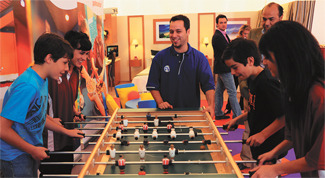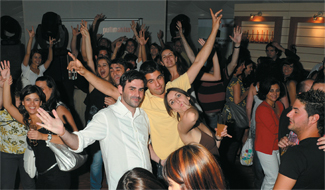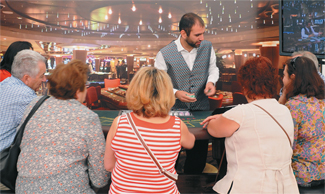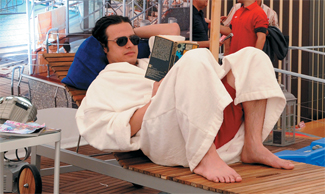
 |
INTERNATIONAL |
Company: Pullmantur S.A.
Event: The Pullmantur Experience
Objectives: Increase brand awareness and cruise reservations; create a client database.
Strategy: Introduce Pullmantur Cruises to the public during a multicity event centered on an inflatable cruise-ship structure.
Tactics: Distribute "passports" to encourage visits to each on-board area and use the information gathered to build a client database.
Results: Generated 9,100 leads and a 100-percent increase in the number of cruises booked.
Creative Agency: Global Events I.D.
Corp. S.L., www.global-events.com
Production Agency: Team Tools, www.teamtools.es
Budget: $2 million
|
 |
imply keeping their companies afloat during the Great Recession was a goal for many business executives, never mind increasing brand awareness or turning a profit. So when Pullmantur S.A., a Spanish travel company specializing in vacation packages, experienced a 50-percent decrease in the number of cruises booked in April 2009, panic set in. What's worse, the fate of the company's cruise line wasn't in its own hands: It had relied exclusively on travel agencies for reservations, and those travel agencies were increasingly steering budget-conscious vacationers away from the perceived "luxury" cruises to what they felt were more affordable getaways - jaunts to the shore, in-city vacation packages, and weekend holidays.
Faced with a sinking bottom line and no life vest of its own to cling to, Pullmantur decided that if it was going to weather this financial storm, it had to come to its own rescue. So the company resolved to shift its drowning business model away from using the travel agencies it had relied on for nearly two decades to a system that finally put Pullmantur in the captain's chair: It would reach out to the general public. By doing so, the company hoped to gain new customers, build a database of those customers so it could market cruises independent of travel agencies, and ultimately turn the cruise-booking tides in its favor.
Abandon Ship
It was no secret to Americans that the U.S. economy had been circling the financial drain since late 2008, but that slow trickle was kept under wraps overseas until it crashed into Europe's shores like a tsunami in the beginning of 2009. "The optimism of our politicians had disguised the recession through 2008, but financial and unemployment figures at the end of the year were a serious blow to not just the economy, but also to the psychology of consumers," says Jorge Hernandez, creative director at Global Events I.D. Corp. S.L., an event-production agency based in Madrid, Spain. The delayed realization that the global economy was vulnerable meant that, for all intents and purposes, the travel industry in Europe had been able to operate business as usual - until the bottom dropped out completely and without much warning.
That information lag was even worse for companies in the cruise industry. Since such companies didn't typically handle their own vacation bookings or deal directly with clients, they had to wait on booking reports from travel agencies before gauging their own financial health. Unfortunately, those reports didn't come in until spring - just weeks before the peak cruising season began each June. What's more, Pullmantur execs had counted on travel agencies and their predictable bookings for so long that the company made the mistake of just assuming the usual cruisers who had, until this point, been extremely reliable would return year after year, economic uncertainty be damned. Well, they were wrong.
With just a few weeks before the first cruise of the peak season was set to embark, Pullmantur had barely enough passengers to fill a dinghy - and little time to remedy the situation. So the cruise line teamed up with Global Events to convince people that cruising was accessible, desirable, and affordable. "The company's main objective was to get as many passengers as possible onto their ships," Hernandez says. "Pullmantur desperately needed enough people to cover the costs of setting sail because canceling the departure of any ship would be very negative for its image." That meant the company had to reach at least 40- to 50-percent capacity on each cruise in order to cover its costs. With the company already treading water, a damaged reputation in the throes of an economic meltdown would surely send Pullmantur Cruises up a creek without a paddle. But how do you convince an armada of people that cruising is much more than a pricey boat ride? You turn to that handy lifesaver called experiential marketing.
After enjoying little success on the heels of its most recent ad campaign, "Todo Llega," or "Everything Arrives" (which comprised print and online ads featuring an image of a full-size cruise liner docked in the middle of a busy city), Global Events had to convince Pullmantur to make a larger splash in the marketing pool. The problem was that it was targeting people who weren't necessarily familiar with the company or its cruise line. "Word of mouth is usually what brings in newcomers," Hernandez says. "So, it became clear that the company had to get people talking and actually display what a cruise could offer in order to convince them it was worth the price."
The next logical evolution of a simple ad campaign, according to Hernandez, would be a road-show event or exhibit of some sort, which Pullmantur had actually pitched. But even that plan came with its own set of challenges. "Pullmantur's execs had thought of doing an exhibition or trailer that would go from one city to the next, but that's where they stopped," Hernandez says. "Nothing really shocking, and visually, from a distance, the trailer they had in mind could have just as easily been for a pharmaceutical company or even a car company. When they came to us with that idea, we told them that we believed it would be an absolute flop. Their brand name was not well known enough beyond usual cruisers, and it was not seductive enough to bring people in to what would be a predictable exhibition."
Convinced that a run-of-the-mill road show was merely a glass of tap water when the company really needed a double dose of Perrier, the creative team at Global Events recalled the cruise line's Todo Llega ad campaign. "We just put the pieces together. If they had already displayed a cruise ship arriving inside a city, that's the concept they should stick to," Hernandez says. Of course, physically transporting an actual 100,000-ton cruise ship and docking it next to the Cathedral of Seville, while impressive, was out of the question financially. So for this concept to work, Global Events and Pullmantur needed a lightweight - yet equally intriguing - alternative. "And that's when we came up with the idea of using an inflatable tent shaped like one of Pullmantur's ships," Hernandez says.
All Aboard
The plan was to work with Spanish production company Team Tools to create an 8,500-square-foot inflatable-tent structure based on Pullmantur's largest cruise ship, the Sovereign, and to tour Spain's largest cities: Seville, Madrid, Barcelona, Valencia, and Bilbao. The road show would set up in centrally located pedestrian areas in each city for five days. Stops included high-traffic areas such as Miquel Tarradell square in Barcelona, the Oceanographic Museum at the City of Arts and Sciences in Valencia, and the Sea Museum and Congress Palace in Bilbao. The hope was that the structure's wow factor would be enough to pull in curious passersby. After all, it's not every day you see a 37-foot-tall inflatable ship "idling" in the middle of a city. It's also not every day you can enter that ship and have a true cruise experience while on land, which is exactly what the unsuspecting citizens of Spain encountered.
In addition to resembling the exterior of the Sovereign, the inflatable-tent structure evoked the cruise liner's interior as well, and harbored everything from a ship's bow and a 135-square-foot state room meticulously appointed to match the ship's actual cabins, to various cruise-ship amenities, including a theater, children's play area, spa, gym, casino, hot tub, solarium, entertainment stage, full-service bar and cocktail area, and climbing wall. The tent also featured carpeting and a PVC flooring material that looked like hardwood floors. "We wanted to be as true to the Pullmantur experience as possible," Hernandez says. "If attendees enjoyed our event, logic says they'd enjoy an actual cruise even more."
As the intrigued masses swarmed the white Sovereign, like the Spanish Armada storming England's shores, at the event's first stop in Seville, May 12 -16, Global Events staffers stood ready to greet attendees at the entrance to the 82-by-125-foot structure. When attendees "boarded" the ship, they were handed a small booklet that contained general information about Pullmantur Cruises as well as descriptions of the on-board areas inside the faux Sovereign, each staffed by an actor playing the part of a Pullmantur Cruise crew member.
The informational booklet doubled as a game piece and lead-capturing tool, and featured a passport that actors in each area stamped for attendees, along with a form on which to fill out personal information. For example, to get his or her passport stamped at the 300-square-foot ship's bow area, an attendee posed for a photograph (think Leo DiCaprio's "I'm king of the world" scene in "Titanic") that was then uploaded to the event's Web site, www.experienciapullmantur.com. Other passport-stamp-worthy activities included receiving a chair massage in the spa area, tackling the climbing wall, and watching a promotional video that highlighted the company's key messages in the theater.
Since the goal of the event was to familiarize attendees with a true Pullmantur cruise experience, Hernandez and his team had to make sure visitors would explore every inch of the ship from bow to stern. The passport was a device Global Events developed to entice attendees to participate in the on-board activities with the promise of a branded gift (such as a baseball cap or T-shirt) in return for a completed passport, thus encouraging longer visits.
The passport activity proved so popular that some attendees lingered inside the tent for an hour or more to complete their passport, watch the promotional video in the theater, and enjoy a drink or two at the bar. "In Seville, with hotter weather and a more relaxed way of life, some people spent entire evenings in the ship, and even came back the next day," Hernandez says.
Attendees who completed the passport - with stamps from each of the 10 activity areas as well as the filled-in personal-information form - turned them in for a branded USB drive, T-shirt, or baseball cap, and were also entered
in a drawing for an invite to the city's closing-night party or even a Renault Grand ScÚnic minivan. "Since we were asking people to provide very personal information like their name, age, phone number, and e-mail address, we figured we'd get a relatively low return on the passports," Hernandez says. "But actually, most attendees didn't view it as a commercial tool and enjoyed the game aspect of getting their passports stamped and turning them in to be entered for the various drawings." Names were drawn daily, winners were notified via phone, and all completed personal-information forms became entries in Pullmantur's new marketing database.
But The Pullmantur Experience wasn't all fun and games. In addition to the cruise-related activities and amenities, the tent structure also housed a sales desk at which interested attendees could receive additional information and even book a cruise. And though the passport activity was aimed at the general public, Global Events and Pullmantur felt it was also important to schmooze with travel agencies, especially since Pullmantur believed they weren't promoting cruises as much during the recession. Sure, the company was trying to take control of its sales, but Pullmantur wasn't about to stop travel agents from encouraging clients to book a Pullmantur cruise. So to avoid burning bridges with the very people that had helped Pullmantur Cruises weather the storm before the recession hit, the company invited travel agents in the host cities to staff the sales desk four of the five days of each event (Pullmantur staffed the desk on Saturdays, the tour's busiest day in each city). Plus, each morning of the event, a select group of travel agents from that respective host city received tours of the ship, enjoyed cocktails and appetizers, and attended keynote speeches by top Pullmantur brass touting the benefits of the company's cruise line and its broad appeal. Finally, the last night of each stop of the tour was devoted to an invite-only party for travel agents (and attendees who won invitations through the passport drawing). The 200 to 300 people that nabbed an invite to the closing-night party in each city enjoyed a free concert, drinks, appetizers, and more.
As soon as the closing-night party concluded in each city, Global Events hoisted anchor and dismantled the ship so it could start the process all over again in the next port of call - sometimes with only a few days in between stops to transport and install the massive structure. Despite the tight timeline and logistical challenges - including a gush of strong wind during evening setup in Madrid that slashed the tent - The Pullmantur Experience hit all five cities on schedule in May and June, staying at each destination for five days, and converting noncruisers to cruisers every step of the way.
Smooth Sailing
By the end of the 25-day road show, staffers had distributed passports to 15,000 potential customers in Spain's five largest cities. And of those 15,000 distributed passports, 9,100 were completed and returned - about 23 percent more than Pullmantur and Global Events had originally hoped for, which wowed the Corporate Event Awards judges. "I'm impressed by the 60-percent return rate on the passports. They successfully turned the event experience into a game that people wanted to play," one judge said. More importantly for Pullmantur, those 9,100 passports represented 9,100 additions to its new customer database. "For us, the greatest response was the fact that people had fun, which we know because of the number of passports handed back, completely filled out," Hernandez says.
In addition to collecting a boatload of new names for its database, The Pullmantur Experience generated a more concrete (and profitable) result for Pullmantur Cruises - bookings. During the months of May and June, reservations jumped by 100 percent since April, and by the end of the tour and Pullmantur's fiscal year, reservations were up by an estimated 6 to 8 percent over the previous year. The fact that Pullmantur was able to generate an increase in sales during a recession year was enough to put the wind back in its sails - and impress the judges, one of whom remarked, "They identified a business problem and used an experiential event to save themselves. On top of that, they generated a database of potential cruisers they didn't have before, allowing them to market directly to the consumer instead of relying on travel agents. This event didn't just help the company survive the recession; it put the company on course for smooth sailing in the years to come."
Indeed, Global Events and Pullmantur Cruises took what was a financial iceberg in April and melted it down to a mere ice cube by June, proving that, sometimes, all you need to navigate dangerous waters is an inflatable boat. E
|





















